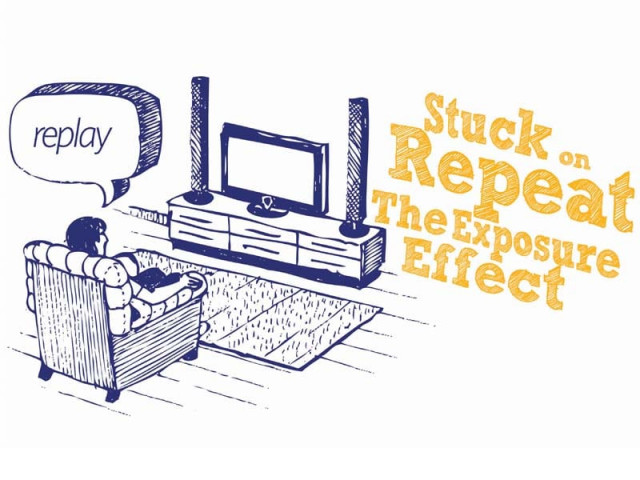Stuck on repeat the exposure effect
Why do we watch the same movies and shows over and over again?

DESIGN BY MARYAM RASHID
Every time the song comes on, a rush of nostalgia hits us hard and makes us press the repeat button. The same is true for evergreen movies like Kabhi Khushi Kabhi Gham and shows like Friends that have struck a chord in our hearts. We know the songs and scripts by heart but can still shamelessly binge-watch these all-time greats whenever we get the chance. But have you ever wondered why we never get sick of them? How does one explain this desire to watch or listen to things on repeat?
Over the years, many philosophers, anthropologists, economists and psychologists have tried to unearth the reasoning behind this phenomenon. In psychology, it is defined as ‘the exposure effect’ wherein people tend to develop a preference for things merely because they are familiar with them. This is also referred to as ‘the familiarity principle.’ Irsa Usman, a behaviour therapist at the Institute of Behavioural Psychology in Karachi, states that a particular behaviour derives its roots from the ways in which our minds are wired to work. “The mind dusts away the unfamiliar and clings onto what it deems familiar. Being a witness to a first time experience is bound to be daunting. Slight doses over a longer period of time tend to shape into more pleasant experiences in our minds,” explains Irsa. For instance, imagine yourself walking in a neighbourhood. Would you feel more comfortable alongside an amiable neighbour or a friendly stranger? The chances are, you will be more at ease in the presence of the neighbour and that, essentially, is the familiarity principle.
Elizabeth Margulis, Professor and Director of the Music Cognition Lab at the University of Arkansas has summed up the phenomenon perfectly in On Repeat: How Music Plays the Mind. She denotes the familiarity principle as an evolutionary process which, on different hierarchies, adapts us to the environment. In other words, it may be a testimony to how our minds are made and who we are. In fact, another study suggests that a connection bridges familiarity with people, in part by showing regions of the brain associated with surges in emotional activity. Therefore, listening to a piece of music, watching a movie or even saying a repetitive phrase teaches people new ways of adding dimensions to perceptions. Zeeshan Mushtaq, a medical student at the University of Sheffield lends credence to this notion with his frantic obsession with the song The Voodoo Child by Jimi Hendrix. The guitarist admits that the song has become a ritual in his daily life and is actually the main reason he started playing the guitar. “I feel a sense of transcendence whenever I hear the song,” shares Zeeshan. “It is like I escape the boundaries and limitations of my own body and feel a unity with the song,” he adds.
As a person learns to listen to the stimulus in more than one ways, it increases the perceptual fluency which makes the repeated experience more pleasing. “The sensation aroused is the building block of such behaviour and attracts the person to the particular activity,” says Irsa. The same thing again and again would make entertainment lose its initial appeal but psychologists believe that repetition actually breeds affection. Simply put, familiarity requires less mental energy for processing and when something is easy to think about, the mind deems it good. So, In a nutshell, the movies we watch on repeat are simply, easy for our minds to process. Nostalgia also plays an important role in making one reminisce on old music or movies. Sometimes we indulge in them to extract fondness or memory about the way things once were. It is the same concept as visiting a restaurant one may have been to with a loved one, in an attempt to relive the moment. Repeating those experiences helps us remember the past and perhaps, the remembrance makes us feel good.
Zohaib Amjad is a scientist with a major in molecular pathology. He tweets as @infectiousuni
Published in The Express Tribune, Ms T, August 9th, 2015.



















COMMENTS
Comments are moderated and generally will be posted if they are on-topic and not abusive.
For more information, please see our Comments FAQ